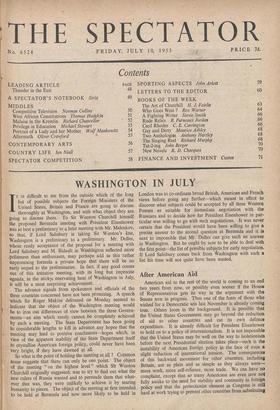After American Aid
American aid to the rest of the world is coming to an end two years from now, or possibly even sooner if the House of Representatives gets its way in the argument with the Senate now in progress. Thus one of the fears of those who wished for a Democratic win last November is already coming true. Others loom in the background. It is possible that the United States Government may go beyond the reduction of aid to other countries and cut its own defence expenditure. It is already difficult for President Eisenhower to hold on to a policy of internationalism. It is not impossible that the United States may be well on the way to isolationism before the next Presidential election takes place—such is the instability of American foreign policy in the face of even a slight reduction of international tension. The consequences of this backward movement for other countries, including Britain, are as plain and as simple as they always were— more work, more self-reliance, more trade. We can have no complaint, except that so many Americans are even now not fully awake to the need for stability and continuity in foreign policy and that the protectionist element in Congress is still hard at work trying to prevent other countries from substituting trade for aid. It is the consequences for the United States itself which are so complex and multifarious that it is hard to see how President Eisenhower, from his present purely defensive position in American politics, can cope with them. Western defence cannot be fully effective if the largest partner has no reliable long-term programme. Western prosperity, however hard the partners may work, cannot insulate itself against the effects of large fluctuations in an American economy which is trying to break loose. Western understand- ing, cannot be maintained by an American Administration which puts itself at the mercy of Congress even when Congress is at its most unreasonable.



































 Previous page
Previous page